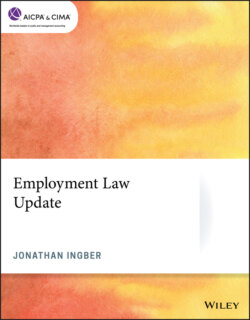Читать книгу Employment Law Update - Jonathan Ingber - Страница 39
Use of company computers and smartphones
ОглавлениеThe Fence-it-In Company (FII) is a manufacturer of metal and wood fences sold at large home improvement and hardware stores. The company provides its employees with internet access through a password-protected home page. The employee policy manual states that employees are not to use FII internet access for any personal purposes. FII does not track the internet use of its employees, but maintains blocks on for-pay, explicit, and common pirated content sites. You have just been hired as the new CFO, and in this position you are responsible for the HR function. You are concerned that FII's policies on internet access might not be strong enough.
What are some of the risks that FII is running?– FII is running a number of risks, including the following:Sending and receipt of personal email using FII internet accessUse of FII internet to access sites for purely personal purposes□ This can be a productivity issue as well as a legal issue.Disclosure or theft of company data on FII's network, including software FII licenses from othersUncertainty of whether FII's blocking function is effective or updated regularly□ Lack of monitoring increases this uncertainty.Employee downloads may bring viruses onto FII's network.Employee downloads of third-party content may violate copyright or trademark laws.
How should FII respond to these risks?– Here are some of the ways in which FII may respond to these risks:Monitor internet use by all employees on a historical (after-the-fact) basis.□ Real-time monitoring is a violation of the Espionage Act unless national security applies.Monitoring should encompass all company devices with internet access.□ An employee's expectation of privacy can be removed by the employee signing a disclosure agreement in which FII advises the employee of its intent to monitor internet use on all company devices.Examine cookies placed on the employee's computer.Install security software that prevents unauthorized downloads from third-party sites, and prevents unauthorized uploads from the FII network.Update all internet use policies and have all employees sign an acknowledgment and agreement to the updated policies. The policies should be clear that personal use of company computers or other devices to access the internet is prohibited; and that company networks, computers, and other devices connected to company networks (on-site or remotely) are property of the employer and should be used only for business purposes.□ This can be a productivity issue as well as a legal issue.□ Those policies should expressly provide that password protection does not, and should not, create an expectation of privacy on the part of the employee, and that employees have no privacy rights in emails, text messages, or voicemail messages that are sent using company computers or routed through company computers, networks, or smartphones.˚ The policies should make clear that unauthorized use of company computers or other devices, unauthorized access to FII data, and use of unauthorized software on FII computers or devices is prohibited and can result in severe disciplinary action up to and including termination. These policies should also provide that˚ company policies regarding harassment, discrimination, retaliation, and other prohibited forms of conduct apply to all types of electronic communications;˚ email and text messages can be reconstructed or recovered after being “deleted,” meaning that deletion will not eliminate a problematic email or text; and˚ employees will be notified of a potential or filed lawsuit or arbitration claim, which will trigger an obligation to preserve all related electronic communications and information, and employees must ensure that all electronic communications and information is thereafter preserved in accordance with the company's document retention policies.Ensure that FII's policies prohibit the use of company computers or other devices to send or receive email that contains content which is illegal, explicit, discriminatory, may be deemed harassment, may be deemed hate speech, is unwelcome, or otherwise violates company policies or company confidentiality.
According to a 2016 survey conducted by Harris Poll for CareerBuilder:2
| of employers had fired an employee for misusing company-provided internet. | |
| of employers monitor internet sites visited by employees. | |
| of employees used their personal smartphones or tablets to shop using the internet during work hours. | |
| of employers fired an employee for holiday shopping on the internet during work hours. | |
| of employers fired employees for postings on social media. The survey did not provide a breakdown of the reasons for termination, for example, divulging company confidential information, use of offensive or harassing language about supervisors or colleagues, or other violations of company policies. |
